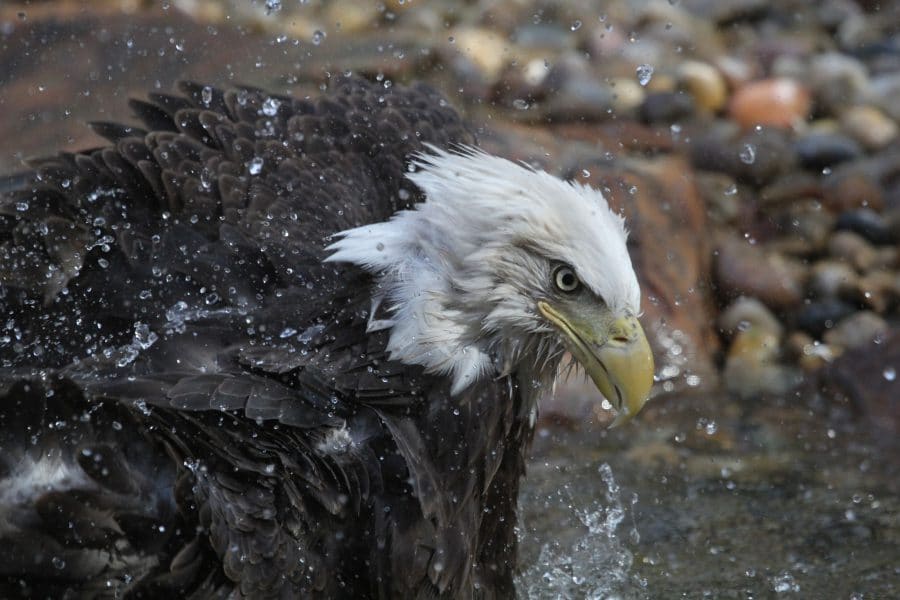As the weather warms, the Citizen Potawatomi Nation Eagle Aviary gears up for the active summer months that include the Family Reunion Festival, the Potawatomi Leadership Program, summer camp tours as well as eagle feather molting. Although it is a busy time for the aviary, the heat requires staff to take precautions, and the severe weather that often accompanies Oklahoma’s warmest months can pose additional issues for the state’s avian populations.

“We live in seasons at the aviary, and our work schedule varies greatly because of that,” said CPN Aviary Manager Jennifer Randell. “We worry more in the summer about the stress heat puts on the birds more than we do the cold in the winter.”
Heat management
The heat affects birds and other reptiles more than mammals that perspire. Staff take special care during the summer to make sure the birds in their care remain healthy and happy.
“Birds don’t have sweat glands, so they don’t sweat like we do to cool down,” said CPN Aviary Assistant Manager Bree Dunham. “They will open their mouth to pant and get rid of excess body heat. Sometimes they will open their wings and raise their body feathers to allow airflow to cool off as well.”
As the days get longer, Randell and Dunham take advantage of the cooler mornings to complete most chores, and they avoid activity during the hottest parts of the day by not holding tours, allowing the eagles to rest.
“The mister system is set on a timer and comes on daily during hot days. The mist helps lower the temperature in the enclosure, and the eagles love it,” Randell said.
“The eagles seem to know when the timer is set to come on and will go wait in line for it to come on.”
The enclosure’s open design allows adequate airflow, and its shade sails offer additional cool spaces for the eagles to seek reprieve from the sun.
The aviary skips feedings for a day once temperatures reach 95 to help prevent the eagles from getting sick. With body temperatures averaging 106 degrees, metabolizing food can cause the eagles to overheat.
“Even raptors in the wild will eat less because of their body temperature and metabolism; they can overheat in the summer if they overeat,” Randell said.
After meals in the summer, the eagles will often make their way to the water features in their enclosures.
“The recirculating streams have deep holding wells and floats to ensure the water level is adequate,” Dunham said. “Fresh water is added to the streams daily and completely changed and cleaned every third day.”
Common injuries
Early spring and into the summer, aviary staff witness a rise in juvenile eagles coming into rehabilitation facilities.
“That first experience out of the nest can be difficult, and like all youngsters, sometimes they don’t always make the best decisions and they learn the hard way,” Randell said. “Most injuries occur from fledging too early or falling from nests, to collisions with power lines, guide wires and cars on roadways.”
In addition to their dedication to the health and well-being of all the animals in their care, aviary staff look forward to the educational opportunities that exist during the warmer months, especially with youth.
“We get a lot of summer youth groups whose focus is on wildlife or STEM programming, and it’s great to get the opportunity to visit with youth who want to be involved with conservation and are interested in improving our environment. It’s exciting to see those kids and for us to hopefully help foster a respect for our wildlife, even in a small way,” she said. “Summer also means our yearly Family Reunion Festival is here as well. That is always a great opportunity to get to visit with so many of our Tribal members as well as having the PLP here. We love sharing what we do and these eagles with our CPN tribal members the most.”
Find more information on the CPN Eagle Aviary, request a tour and more at potawatomiheritage.com.
